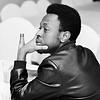Take a photo of a barcode or cover
Good book, a little heavy on calling it all “negative thinking” since you can get caught in a cycle of meaning and re-defining things. But the basic idea of the book and the tools it points you too are stuff I’ve been diving into via other sources and it’s all great stuff. Cool to read his own journey into stoicism, meditation, and the anti-goal movement. All things I think are really helpful to us as humans and leaders. If you’re not familiar with those things, you did to drop what you’re doing and read this book.
hopeful
informative
inspiring
reflective
slow-paced
medium-paced
As anti-self-help books go, it's a good one. It's well-written, but relies a bit too much on quoted text from other authors.
informative
inspiring
reflective
fast-paced
Overall, the path to happiness is simply understanding that you won't always have it and focusing on it will only make you unhappy. Great book!
hopeful
informative
inspiring
reflective
medium-paced
I loved this way more than one might expect for a book for "people who hate positive thinking." This book had useful, actionable advice on facing adversity and framing difficulty that doesn't involve negating the difficulty itself.
I think this was a goodreads giveaway...
It was an interesting read, and I especially liked the chapter that detailed the ideas of the Day of the Dead in Mexico (although the author took some over-the-top risks).
I do have to mention that I find Ellis' explanation of stoicism (about p. 43) to be horse droppings - because he claims that nothing is 100% bad and that things could always be worse.... but I contend that the Holocaust would qualify as 100% bad, and that many find the facts of the matter pretty unimaginable - and why would one imagine something worse? Further, words can hurt - verbal abuse certainly does harm people and can cause PTSD.
In the chapter titled Who's There, the book discusses the separation of 'me' being what's in my head vs. the rest of my body.... and that the body is not necessary, yet amputees and breast cancer survivors who have struggle with this very definition of 'me' - are they who they think they are with only one leg? are they still a woman with no breasts?
Nevertheless, it is an interesting and thought provoking book and I would recommend it.
It was an interesting read, and I especially liked the chapter that detailed the ideas of the Day of the Dead in Mexico (although the author took some over-the-top risks).
I do have to mention that I find Ellis' explanation of stoicism (about p. 43) to be horse droppings - because he claims that nothing is 100% bad and that things could always be worse.... but I contend that the Holocaust would qualify as 100% bad, and that many find the facts of the matter pretty unimaginable - and why would one imagine something worse? Further, words can hurt - verbal abuse certainly does harm people and can cause PTSD.
In the chapter titled Who's There, the book discusses the separation of 'me' being what's in my head vs. the rest of my body.... and that the body is not necessary, yet amputees and breast cancer survivors who have struggle with this very definition of 'me' - are they who they think they are with only one leg? are they still a woman with no breasts?
Nevertheless, it is an interesting and thought provoking book and I would recommend it.
Yet another wonderful book I've had the pleasure of reading...
Have to admit that what drew me first to this book was the subtitle ending: "people who can't stand positive thinking". Such a brilliant way to describe myself. I know :)
The book wasn't an all-out assault against "self-help" books as I'd expected (not that it would've hurt), rather a critical look at why this absurd emphasis on positive thinking, visualization and self-affirmation might itself be an hindrance towards achieving "Happiness". The book explores brilliantly different ways to look at "being happy" and Happiness in general.
The author draws a Lot of inspiration from Stoicism and Buddhism throughout the book. Surprisingly too: Eckhart Tolle and Allan Watts, much to my delight.
I must mention too, yet another book I've read this year that challenges the notion of "self". Huh! :)
Overall, I found the book highly delightful, informative and insightful. Highly recommend it to anyone who needs a "self-help" book that doesn't involve positive thinking or equally ghastly: setting goals.
Have to admit that what drew me first to this book was the subtitle ending: "people who can't stand positive thinking". Such a brilliant way to describe myself. I know :)
The book wasn't an all-out assault against "self-help" books as I'd expected (not that it would've hurt), rather a critical look at why this absurd emphasis on positive thinking, visualization and self-affirmation might itself be an hindrance towards achieving "Happiness". The book explores brilliantly different ways to look at "being happy" and Happiness in general.
The author draws a Lot of inspiration from Stoicism and Buddhism throughout the book. Surprisingly too: Eckhart Tolle and Allan Watts, much to my delight.
I must mention too, yet another book I've read this year that challenges the notion of "self". Huh! :)
Overall, I found the book highly delightful, informative and insightful. Highly recommend it to anyone who needs a "self-help" book that doesn't involve positive thinking or equally ghastly: setting goals.




